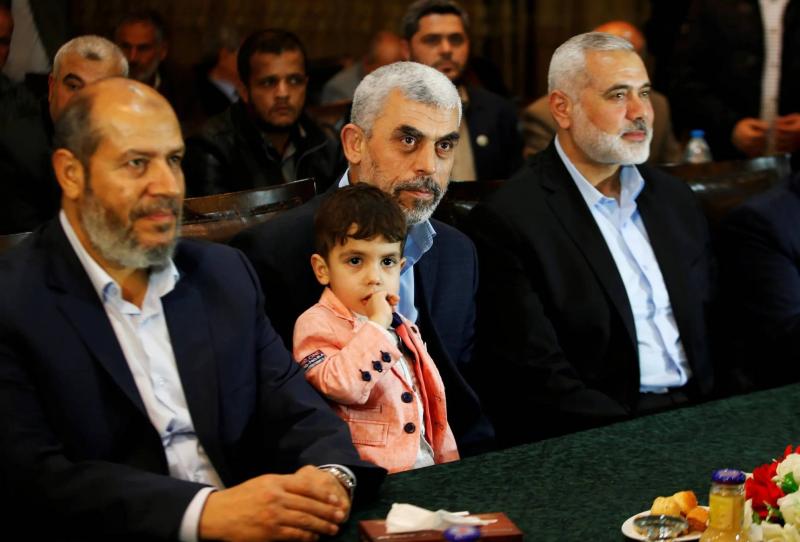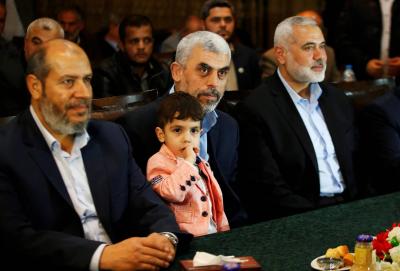Yahya Sinwar, the leader of the Islamic Resistance Movement (Hamas) in the Gaza Strip, spent more than two decades imprisoned in Israeli jails before being released. The American newspaper Wall Street Journal published a lengthy article about Sinwar under the title "The Hamas Leader Who Studied the Psychology of Israel and Bets His Life on What He Learned." The article stated that Sinwar relies on his judgment of Israeli society after two decades of studying in prison, learning Hebrew, watching local news, and understanding the Israeli psyche. He led a strategy to exploit Israel's willingness to exchange Palestinian prisoners for hostages.
The newspaper revealed that when Sinwar was imprisoned in Israel over a decade ago, he explained to an Israeli official a theory that has now become central in the war in Gaza. He indicated that what Israel sees as a strength—namely, that most Israelis serve in the army and that soldiers hold a special status in society—is actually a weakness that can be exploited, according to Yuval Biton, who spent some time with Sinwar as the former head of Israeli prisons. The accuracy of Sinwar's insights was demonstrated in 2011 when he was one of 1,027 Palestinian prisoners released in exchange for one Israeli soldier.
Currently, Sinwar is holding 138 Israelis, including soldiers, and he bets that he can secure the release of thousands of Palestinian prisoners and achieve a permanent ceasefire based on his assessment of Israeli society. However, the article notes that Hamas must first survive a strong and deadly Israeli counterattack. If Hamas miscalculates, Sinwar could oversee the destruction of the group, which the United States classifies as a terrorist organization in Gaza, and lose his life. This situation was described as a "gamble," which has already come at a heavy cost, including widespread destruction in Gaza and the martyrdom of around 17,700 Palestinians.
After negotiating the release of women and children during a temporary ceasefire that collapsed this month, the Israeli government is under increasing pressure to work with Sinwar to release the remaining captives. Biton stated that Sinwar understands that Israel will pay a heavy price, saying, "He understands that this is our weakness."
According to the newspaper, during the recent hostage negotiations, Sinwar cut off communications for several days to pressure Israel into agreeing to a temporary ceasefire that would allow Hamas time to regroup, as indicated by Egyptian mediators. When hostages were released, they were gradually freed each day, rather than all at once, creating a daily sense of anxiety in Israeli society.
Currently, Sinwar is the main decision-maker in Hamas as the top political leader in Gaza, working closely with the military wing of the movement. Meanwhile, Hamas political bureau chief Ismail Haniyeh resides in Doha, and his deputy Saleh al-Arouri is based in Beirut. While Hamas's leadership usually makes decisions based on consensus in normal times, Israel believes that Sinwar and Hamas fighters around him in Gaza are managing the war more tightly, according to the Wall Street Journal.
Following the recent collapse of the ceasefire, Hamas stated that the resistance has only captive soldiers and "civilians serving in the army," and it will not release more of them until Israel ends its war. The movement expressed readiness to release all Gaza captives in exchange for all Palestinian prisoners in Israeli jails, estimated to number over 7,000. Israel claims that Hamas still holds civilians and soldiers.
The American newspaper noted that when Sinwar was released in the 2011 exchange deal, he believed that Hamas should exert significant pressure on Israel to release Palestinians responsible for attacks that killed Israelis and who were serving multiple life sentences, according to involved individuals. After his release, Sinwar told those who did not follow through that he would work to free them, the article recounted.
Sinwar was involved in the abduction and killing of two Israeli soldiers and the murder of four Palestinians who cooperated with Israel, according to the Israeli army, and he was sentenced to life in prison, spending 22 years incarcerated. He was also a significant figure within the prison system. Prisoners are one of Hamas's four power bases, alongside members in the West Bank, Gaza, and the diaspora outside Palestinian territories, according to Israeli officials and independent researchers, as stated in the article.
Sinwar gave Israeli officials the impression that he wanted to stop the violence, at least in the short term. At the end of the Palestinian uprising in 2005, an Israeli journalist interviewed Sinwar inside prison, and the leader told the journalist that Hamas would be open to a long-term ceasefire with the Israelis, which he said could lead to regional stability, but it would never accept Israel as a state. He at that time acknowledged that Hamas would never be able to defeat Israel militarily.
In 2006, Hamas militants surprised Israeli soldiers at a command center on the Gaza border and abducted 19-year-old Gilad Shalit. One of those responsible for organizing the abduction, according to Israeli officials, is Muhammad, Sinwar's younger brother. During negotiations between Israel and Hamas regarding Shalit's release, Sinwar exerted influence to push for the freedom of Palestinians imprisoned for killing Israelis. An Egyptian official who helped mediate the deal said that Sinwar was very hardline in his demands, to the extent that Israel placed him in solitary confinement to limit his influence within Hamas.
A week after his release in 2011, Sinwar told the Palestinian news agency Safa that the best option to free remaining prisoners inside was to abduct more Israeli soldiers. Sinwar once again exerted his influence within Hamas, and during the 2014 war, he was involved in the arrest and killing of Palestinian informants suspected of collaborating with Israel, according to Israeli and Egyptian officials.
In 2017, Sinwar was elected as Hamas's leader in the Gaza Strip by its members. Other Hamas leaders assured members that his election as head of Gaza would not drag the group into new rounds of internal and external violence, according to Hamas officials. Sinwar publicly reiterated that Hamas is committed to releasing every Palestinian prisoner in Israeli jails. In 2021, Sinwar won a second term as Hamas leader in Gaza, once again pledging to free Palestinian prisoners. In May of that year, Hamas fired rockets at Jerusalem, which helped ignite an 11-day conflict.
The death and destruction caused by the conflict created a sentiment among the Israeli security establishment that Hamas had been deterred and that Sinwar would not attempt an offensive because he was more focused on rebuilding the sector economically. However, the Al-Aqsa Flood operation on October 7 revealed that this was inaccurate, leaving Israel with no choice but to destroy him, according to Amos Gilad, a former senior Israeli defense official.




